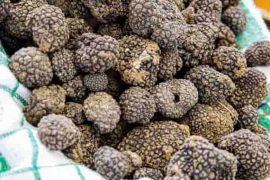Sardines can be considered one of the healthiest fish and are presented as superfoods. They belong to fatty fish, so they are a rich resource of unsaturated omega-3 and omega-6 fatty acids, which have a healing effect on the circulatory and nervous systems. Consuming these small fish will help lower blood pressure, improve blood circulation and reduce the risk of atherosclerosis, heart attack, or stroke. It is worth noting that sardines – because they are small – practically do not contain mercury, toxins and other harmful substances.
They can enrich the diet of pregnant women and children, as they also contain folic acid, which supports the development of the nervous system. Sardines will also have a positive effect on strong and healthy bones due to their vitamin D and calcium content. What other properties do sardines have? Why is it worth eating?
Characteristic Sardines
Sardines are small marine fish from the herring family from 15 to 30 cm long. European sardines swim in the Mediterranean Sea and the Atlantic Ocean off the coast of Spain, Portugal, France and the UK. Pacific sardine, on the other hand, is mined off the coast of Japan, South and North America, Australia and South Africa. Sprats are also known as Norwegian sardines. These small fish are used to make fish meal and are also used by fishermen as bait. However, they are mainly mined in food, whether raw, dried or smoked.
Sardines are a source of many nutrients, including unsaturated fatty acids, which strengthen the heart and brain. They also contain healthy protein, folic acid and other B vitamins that support the nervous system, as well as vitamin D and valuable minerals: iron, calcium and selenium. It is worth noting that they are practically not contaminated with toxins and heavy metals, which can not be said about large sea fish.
Sardine Properties
It is worth including sardines in your diet, because they have a very positive effect on health. They contain omega-3 and omega-6 fatty acids, which lower blood pressure, eliminate cholesterol and improve blood circulation. Thus, sardines protect against hypertension, atherosclerosis, myocardial infarction and other cardiovascular diseases. Unsaturated fats (including DHA and EPA) also enhance immunity and inhibit the development of inflammation, which is the source of many chronic diseases, such as rheumatoid arthritis.
Many vitamins accumulate in sardines, including those from group B. In turn, folic acid supports the development of the nervous system and prevents fetal malformations.
Therefore, sardines are recommended for pregnant women and children, especially since they do not contain heavy metals. The vitamin B12 present in them supports the cardiovascular system, participating in the production of red blood cells. Sardines also contain vitamin B 3, which plays a large role in the distribution of amino acids, carbohydrates and fatty acids, which improves the digestive system and increases metabolism. B vitamins also protect against depression, fight insomnia and stress, and improve memory.
In addition, sardines contain vitamin D and calcium, compounds that reduce the risk of osteoporosis and strengthen bones and tooth enamel. Vitamin D also supports immunity and prevents depression and cancer. Sardines are also a source of iron, which protects against anemia and selenium, which are necessary for the thyroid to function properly. In addition, it has been shown that sardines are able to counteract macular degeneration, which impairs vision.
How to eat sardines
Most often, you can find sardines sold in jars in oil or tomato sauce. This is a rather cheap and easily accessible option, unfortunately, such a fish is not very healthy. They contain a lot of salt and oil, which makes them high-calorie, and in addition, they are enriched with preservatives and artificial flavors. In addition, heavy metals and bis phenol, a compound that impairs hormonal balance, can be placed in aluminum fish packaging.
Therefore, it is better to choose raw, dried or smoked sardines and cook them yourself. They are great as a complement to sandwiches, salads, scrambled eggs, pizza or as egg toppings. They can also be baked, grilled and combined with porridge or tomato sauce.








